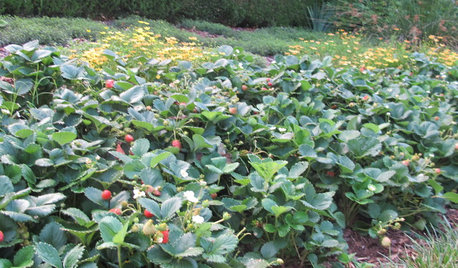Looking for Organic fertilizer 6-24-24
slacker
15 years ago
Related Stories

GARDENING GUIDESGet on a Composting Kick (Hello, Free Fertilizer!)
Quit shelling out for pricey substitutes that aren’t even as good. Here’s how to give your soil the best while lightening your trash load
Full Story
GARDENING GUIDESHow to Switch to an Organic Landscape Plan
Ditch the chemicals for a naturally beautiful lawn and garden, using living fertilizers and other nontoxic treatments
Full Story
KITCHEN DESIGN24 Hot Ideas for Stashing Spices
Create a Mini Spice Pantry in a Wall, Drawer, Island or Gap Between Cabinets
Full Story
MORE ROOMS6 Garage Organizing Tips That Really Work
National Clean Out the Garage Day: Here's how to clear the clutter and organize what's left
Full Story
KITCHEN DESIGN24 Dramatic Kitchen Makeovers
From drab, dreary or just plain outdated to modernized marvels, these kitchens were transformed at the hands of resourceful Houzzers
Full Story
MORE ROOMS24 Amazing Walls of Books
Take a page from wall-high shelves for books remembered, and yet to read
Full Story
REGIONAL GARDEN GUIDESSoutheast Gardener's September Checklist
Fertilize strawberries, plant a tree or two and beckon hummingbirds to your Southern garden this month
Full Story
EVENTSDesign Calendar: Feb. 4-24, 2012
Unbuilt D.C. exhibit, Indianapolis walking tour, disaster recovery talk and more
Full Story0

LANDSCAPE DESIGN24 Garden Paths to Inspire Memorable Journeys
Winding or straight, narrow or wide, densely or sparsely planted — there’s more than one way to design a walk
Full Story
EVENTSDesign Calendar: Feb. 24–March 16, 2012
Visit David Stark's pop-up Wood Shop, the Philadelphia International Flower Show and more
Full Story0



marshallz10
dchall_san_antonio
Related Discussions
3-5-7 or 6-6-4 organic fertilizer
Q
24 Tomato Cages, 24 Tomatoes to choose from
Q
Bamboo that'd last at least a year in 24" x 6" deep zone 6 container?
Q
tile size 6x24 or 6 x 40
Q
slackerOriginal Author
dchall_san_antonio
Kimmsr
justaguy2
gardengal48 (PNW Z8/9)
slackerOriginal Author
marshallz10
dchall_san_antonio
slackerOriginal Author
marshallz10
slackerOriginal Author
dchall_san_antonio
Kimmsr
justaguy2
marshallz10
marshallz10
slackerOriginal Author
marshallz10
gardengal48 (PNW Z8/9)
dchall_san_antonio
gatormomx2
dchall_san_antonio
peter_6